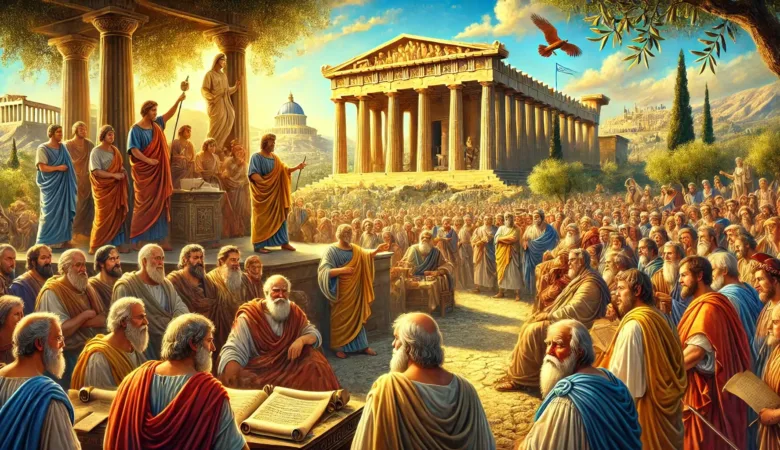When we think of democracy today, our minds often leap to modern nations with their complex representative systems and constitutions. But the roots of democracy, as a system of governance, can be traced back to Ancient Greek democracy, particularly in Athens during the 5th century BCE. Here, the Athenians pioneered a groundbreaking form of government that gave ordinary citizens a direct voice in decision-making. This was a radical departure from the monarchies and oligarchies that dominated the ancient world.

What made Ancient Greek democracy so revolutionary? For the first time in recorded history, power was not concentrated in the hands of a king, an elite ruling class, or a religious authority. Instead, it was distributed among the people, giving rise to a concept we now recognize as democracy. While limited in scope (as it excluded women, slaves, and non-citizens), Ancient Greek democracy was groundbreaking in its principles and execution. It laid the foundation for the idea that governance should be based on equality, active participation, and accountability.
What were the reasons behind the success of Ancient Greek democracy? How did a small city-state like Athens manage to create and sustain such an innovative system? This article delves into the 10 key factors that contributed to the enduring legacy of Ancient Greek democracy, exploring how the Athenians managed to turn an abstract idea into a functional and flourishing political system.
Inclusive Citizen Participation
One of the most revolutionary aspects of Ancient Greek democracy was its emphasis on the participation of ordinary citizens. Unlike many ancient societies ruled by monarchs or oligarchs, Athens allowed male citizens, regardless of wealth or status, to have a voice in decision-making processes. The concept of “isonomia,” or equality before the law, was central to their system.
While women, slaves, and non-citizens were excluded, the broad inclusion of free males was a step forward for the era.
Direct Democracy
Athens practiced a direct democracy, meaning citizens were directly involved in legislative and executive functions rather than electing representatives. This form of governance, central to Ancient Greek democracy, allowed citizens to vote on laws and policies in the assembly (Ekklesia), fostering a strong sense of ownership and accountability among the population.
Education and Philosophy
The success of Ancient Greek democracy can be attributed to the emphasis on education and critical thinking. Philosophers like Socrates, Plato, and Aristotle encouraged debate, inquiry, and the pursuit of knowledge. Educated citizens were better equipped to engage in democratic processes, ensuring more informed decision-making.
Effective Institutions
Ancient Greek democracy relied on well-organized institutions such as:
- The Assembly (Ekklesia): Open to all male citizens for debating and voting on laws.
- The Council of 500 (Boule): Responsible for preparing laws for discussion.
- The People’s Court (Dikasteria): Where citizens served as jurors.
These institutions ensured that power was distributed and no single individual or group could dominate.
Rotation and Lot System
To prevent corruption and concentration of power, many public offices in Athens were filled through a lottery system (sortition). This innovative method, unique to Ancient Greek democracy, ensured that governance was not limited to the wealthy elite. Rotation of offices also allowed a broader range of citizens to gain experience in administration and decision-making.
Public Accountability
Leaders and officials in Ancient Greek democracy were held accountable for their actions. Mechanisms like ostracism allowed citizens to vote to exile individuals deemed a threat to the state. This system acted as a check against tyranny and ensured that power remained in the hands of the people.
Economic Stability
The economic prosperity of Athens during its democratic era played a crucial role in its success. The wealth generated from trade, agriculture, and the silver mines of Laurium provided the resources needed to support public works, military defense, and democratic institutions.
Without economic stability, maintaining such a complex system of governance like Ancient Greek democracy would have been nearly impossible.
Military Strength and Unity
The Athenian navy and hoplite army, often manned by citizens, fostered a sense of unity and shared purpose. Participation in defense reinforced the idea that citizens had a stake in the survival and success of their city-state, further strengthening the democratic ethos central to Ancient Greek democracy.
Cultural Flourishing
The democratic period in Athens coincided with a cultural golden age. Achievements in art, drama, architecture, and literature, supported by state patronage, fostered a shared civic identity. This cultural pride united citizens and encouraged participation in governance.
Famous works like the tragedies of Sophocles and the construction of the Parthenon symbolized the collective power of the people under Ancient Greek democracy.
Adaptability and Reform
Ancient Greek democracy was not static; it evolved over time through reforms introduced by leaders like Solon, Cleisthenes, and Pericles. These reforms addressed inequalities, expanded citizen participation, and refined the structure of governance. Adaptability ensured the system remained relevant and functional.
Legacy of Ancient Greek Democracy
The success of Ancient Greek democracy was not without its flaws, but its principles of citizen involvement, equality, and public accountability have stood the test of time. Modern democratic systems owe much to the innovative practices of Athens, which continue to inspire governance structures around the world.
By understanding these reasons, we can appreciate how Ancient Greek democracy created a system that has become a cornerstone of modern civilization.
